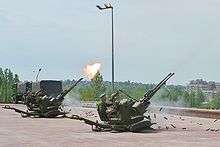ZU-23-2
| ZU-23-2 | |
|---|---|
|
A ZU-23-2 | |
| Type | Towed 23 mm Anti-Aircraft Twin Autocannon |
| Place of origin | Soviet Union |
| Service history | |
| In service | 1960 – present |
| Used by | See Operators section |
| Production history | |
| Designed | Late 1950s |
| Produced | 1960 - still in production |
| Variants | See Variants section |
| Specifications (ZU-23-2) | |
| Weight | 0.95 tonnes (2,094 lbs) |
| Length | 4.57 m (10 ft) |
| Barrel length | 2.008 m (79.1 in) (87.3 calibers) |
| Width | 2.88 m (9 ft 5 in) |
| Height | 1.22 m (4 ft) |
| Crew | 2 -- gunner and commander |
|
| |
| Shell | 23x152B |
| Caliber | 23 mm |
| Barrels | 2 |
| Traverse | 360° |
| Rate of fire | 2000 rpm cyclic, 400 rpm practical |
| Effective firing range | 2.5 km (2 mi) |
The ZU-23-2 "Sergey", also known as ZU-23, is a Soviet towed 23 mm anti-aircraft twin-barreled autocannon. ZU stands for Zenitnaya Ustanovka (Russian: Зенитная Установка) - anti-aircraft mount. The GRAU index is 2A13.[1]
Development history
The ZU-23-2 was developed in the late 1950s. It was designed to engage low-flying targets at a range of 2.5 km as well as armoured vehicles at a range of two kilometres (km) and for direct defense of troops and strategic locations against air assault usually conducted by helicopters and low-flying airplanes.[2] In 1955, KBP presented the single-barrel ZU-1 and the twin-barrel ZU-14. While the former was eventually dropped, the ZU-14 was selected and, after some modifications, entered series production.
In the Soviet Union, some 140,000 units were produced. The ZU-23 has also been produced under license by Bulgaria,[3] Poland, Egypt[4] and the People's Republic of China.[5]
Development of this weapon into a self-propelled anti-aircraft gun (SPAAG) led to the ZSU-23-4 Shilka.
Description
The ZU-23-2 (2A13) mounts two 2A14 23 mm autocannons on a small trailer which can be converted into a stationary mount for firing the guns. While in this position the wheels are moved aside. The autocannon can be prepared for firing from the march position in 30 seconds and in emergency can be fired from the traveling position. The weapon is aimed and fired manually, with the help of the ZAP-23 optical-mechanical sight which uses manually entered target data to provide limited automatic aiming. It also has a straight-tube telescope T-3 for use against ground targets such as infantry as well as unarmored or lightly armoured vehicles. The ammo is a feed by a conveyor belt from two ammunition boxes. Each of the ammunition boxes are located on the side of the twin autocannon and each carries 50 rounds. The fumes created by firing the weapon are partially removed through the side openings in the barrels. It is also used on the soviet IL-28 jet bomber[2]
Normally, once each barrel has fired 100 rounds it becomes too hot and is therefore replaced with a spare barrel. Each weapon is normally provided with two replacement barrels as part of its standard equipment. Tulamashzavod Joint Stock Company is offering to upgrade the 2A14 guns to the 2A14M standard with a barrel life of 10,000 rounds instead of 8,000 rounds.
The cannon carriage is based on the earlier ZPU-2 anti-aircraft twin heavy machine gun, which mounted two KPV 14.5 mm heavy machine guns. ZU-23-2 can be identified by different placement of the ammunition boxes (at right angles to the gun carriage) and by muzzle flash suppressors. In another similarity to the ZPU series, single-barrel and four-barrel versions of the ZU-23 were also developed. However, these versions never entered service.
ZU-23-2 can be towed by a number of different vehicles. In USSR and later Russia the most frequently used towing vehicles for it were GAZ-66 4x4 trucks and GAZ-69 4x4 light trucks.[2]
Ammunition
The 23mm AA guns utilizes the same 23x152B case as the wartime VYa aircraft cannon. Due to different loadings and primers the ammunition is not interchangeable, however; ammunition of the anti-aircraft cannon can be identified from its steel casings, ammunition for the aircraft cannon having brass cases instead.[6] The following table lists the main characteristics of some of the available 23x152B ammunition used in 23mm AA guns:
| Designation | Type | Projectile Weight [g] | Bursting charge [g] | Muzzle Velocity [m/s] | Description |
|---|---|---|---|---|---|
| BZT | API | 190 [7] | ? | 970 | Blunt AP steel core, with incendiary charge inside windshield cap.[7] Penetration 15 mm RHA at 1000 m range and 30 degree impact angle (from perpendicular), tracer burn time 5 seconds. |
| OFZ | HE | 184 [7] | 19 [8] | 980[7] | HE fragmentation round with nose fuzes incorporating self-destruct mechanism.[7] |
| OFZT | HE-T | 188[7] | 13 [8] | 980[7] | HE fragmentation round with a reduced HE charge due to the space taken by the tracer; tracer burn time 5 seconds. |
| APDS-T | APDS-T | 103 | none | 1220 | A Polish sub-caliber armour-piercing round with tracer. Penetration 30 mm RHA at 100 m range and 30 degree impact angle (from perpendicular), tracer burn time >2.5 s. |
Not only the gun itself but also the ammunition is produced in several countries. In Bulgaria, the company ARCUS Co. produces rounds and fuses for the 2A7 and 2A14 guns.[9]
Service history
ZU-23-2 entered service with the Soviet Army in 1960. ZU-23-2 is often mounted on trucks for use in both anti-aircraft and fire support roles. It can also be mounted on the roof of the MT-LB multi-purpose tracked APCs. Specially modified three-legged ZU-23-2 is used in BTR-DG based airborne SPAAG. Cheap, easy to operate and still effective, the ZU-23-2 is still used by the Russian Army and by more than 20 other armies.
During the Soviet–Afghan War, the Soviet forces put ZU-23-2 sets to secure the air defense of occupation area and used as fire support. In the later Afghan War, the belligerents including Taliban and Northern Alliance used ZU-23-2, along with the SA-7 or Stinger Missile, as their primary air-defense weapons.
In late 1983, the ZU-23M was used in attacks against U.S. Marine ground forces fighting with the Multinational Force in Lebanon. At the time, a Marine spokesman described such antipersonnel use of the weapon as a violation of the laws of war; however, writing for the Marine Corps Gazette in 1988, Maj. W. Hays Parks dismissed this allegation as incorrect.[10]
The type has seen widespread use by both sides in the Libyan Civil War often mounted on technical pickup trucks.[11] The weapon has been heavily used in the Syrian Civil War. YouTube videos depict the weapon bolted on to pickup trucks and one was even successful in shooting down a Syrian helicopter.
Variants and upgrades
Russian Federation

- ZU-23M - Upgraded variant, designed by the Nudelman Precision Engineering Design Bureau (KB Tochmash). Has new targeting system (which includes laser rangefinder, television channel, optical mechanic device, can be reinforced with thermo location channel and a television system for usage at night) and electromechanic turn system. Optionally, the mount can be fitted with two short-range air-defence missiles, such as the 9M32M "Strela-2M" or the 9M39 "Igla".[12][13]
- ZU-23M1 - This is the current model, developed by Open Joint Stock Company Podolsky Electromechanical Plant of Special Engineering “PEMZ Spetsmash” and Closed Joint Stock Company “NTC Elins” and offered by Rosoboronexport. Like the ZU-23M, it has an upgraded fire control system and can optionally be fitted with two launchers for the "Igla" series missile, usually the 9M342 "Igla-S".[14]
- The complete air-defence gun/missile system is called ZU-23/ZOM1 (often erroneously called “ZU-23/30M1”). It consists of the "missile-gun firing module" (strel’bovoj modul) ZU-23/ZOM1-SM; the "missile-launching module" (puskovoj modul) ZU-23/ZOM1-PM armed with four 9M333 “Strela-10” missiles; a remote control module (modul distantsionnogo upravleniya) ZU-23/ZOM1-MU and a portable generator AB-1. Depending on the wishes of the client, the system can be delivered without the -SM module (ZU-23/ZOM1-1), without the -PM module (ZU-23/ZOM1-2), without the remote control (ZU-23/ZOM1-3), or without -PM and -MU modules (ZU-23/ZOM1-4).[15]
Poland

- ZU-23-2 - Polish designation for basic gun variant. Built under license in Zakłady Mechaniczne "Tarnów" S.A. since 1972.[16]
- ZUR-23-2S "Jod" - Polish variant with electro-optical sight GP-1R and twin launcher for "Strela-2M" missiles, used from 1988[16] (picture).
- ZUR-23-2KG "Jodek-G" - Development of ZUR-23-2S with more advanced reflex sight CKE-2 (later CP-1 night-and-day sight with laser rangefinder), electromechanic gun turn system and twin launcher for "Grom" missiles, produced from 2002[16] (pictures).
- ZUR-23-2KG-I - Improved export version for Indonesia with CKE-2I sight.
- TR-23-2 - Training simulator version of the ZUR-23-2KG-I. The set consists of an instructor's station and a gunner's station (a modified "artillery-missile unit" with the sight replaced by a computer station). Both stations are linked by a wireless network.[17]
- Kobra - Short-range modular air-defense system. A typical battery consists of up to 6 guns (for example ZUR-23-2KG), up to 6 Poprad systems, a WD-95 command post and a Radwar MMSR radar.[18]
- ZUR-23-2KG "Jodek-G" - Development of ZUR-23-2S with more advanced reflex sight CKE-2 (later CP-1 night-and-day sight with laser rangefinder), electromechanic gun turn system and twin launcher for "Grom" missiles, produced from 2002[16] (pictures).
- ZU-23-2M "Wróbel" - Polish naval version of ZU-23-2, hydraulically powered, produced from 1979.[16]
- ZU-23-2MR "Wróbel-II" - Polish naval version of ZUR-23-2S, with Strela-2M missiles and water-cooled barrels, produced from 1986[16][19] (picture).
- "Hibneryt" - A ZU-23-2 family gun mounted on specially modified Star 266 truck, truck is fitted with additional ammunition for the gun and modified electrical installation to power guns electromechanic turn system (gun can also work from batteries).
- ZUR-23-2S "Jod" - Polish variant with electro-optical sight GP-1R and twin launcher for "Strela-2M" missiles, used from 1988[16] (picture).
Czech Republic
- ZU-23-2M2 Vlara - Field upgrade modernization kit. (picture).
Slovak Republic
- ZU 23M - Upgraded version with automatic fire control system, developed by the EVPU company.[20] This version is offered by EVPU and the Punj Lloyd Ltd of India to the Indian army.[21]
Egypt
- ZU 23-M - Licence version of the ZU-23. It is also known as SH-23M and is produced by Abu Zaabal Engineering Industries (Factory 100).[4]
- Nile 23 - Self-propelled version on the tracked M113. A system consists of the combat vehicle with ZU 23-M guns and surface-to-air missiles Saqr Eye, and a tracker vehicle, also based on the M113.[22][23]
- Sinai 23 - Similar to the Nile 23, but with the guns and missiles mounted on a TA-23E turret, fitted with a RA-20S E-band radar. Instead of the Saqr Eye, FIM-92 Stinger missiles can be used.[24]
Finland
- 23 ItK 95 - Finnish upgrade of the original 23 ItK 61, designed by Instrumentointi Oy and Vammas Oy. The upgraded gun is equipped with a gyro-stabilized gun, an APU and a laser range finder. ().[12]
- SAKO 23 mm/87 - a navalized modernization used by the Finnish Navy. Variants are the 23 M74, the 23 M77, the 23 M80 and the 23 M85. The guns can be removed from M85 carriage and replaced with six Mistral surface-to-air missiles.[25]
China
- Type 85/YW 306 - Reverse-engineered copy of the ZU-23-2, made by NORINCO.[5] Initially it was offered for export as the G-AA-01.[26] It is referred to as Type 85 gun by some sources.
- Giant Bow - Also known as Shengong (Deity Bow, 神弓). This is the name of an air-defense system which consists uf up to eight Type 85 guns and a battery command vehicle (BCV).[5]
- Giant Bow II a.k.a. Shengong-II - This is a more modern version of the Giant Bow and is offered for export since 2005. Apart from the 23mm guns, it also comprises TY-90 missile launchers and a 3D radar.[5]
- Type 87 - Upgraded version with twin 25mm guns for 25x183B ammunition such as the PG87. After a failed initial design, an improved design was developed in 1979 and ready for evaluation in 1984. The Type 87 gun was accepted for service in 1987. It has the same layout as the original model and consists of two automatic, recoil-operated cannons, a two-wheel cartridge, a Type 86 infrared tracking sight and two 40-round ammunition magazines. The Type 87 fires in either single shot or burst mode, with a cyclic rate of fire of 600~700 rounds/min and has a muzzle velocity of 1,050 m/s.[27]
- PGZ95 - self-propelled version of the Type 87.
Iran
- Mesbah-1 - Iranian-made air-defence and anti cruise missile system with four ZU-23 mounts. For the first time presented in 2010.
- ZU-23-6 (unofficial designator) - Similar to the Mesbah-1 but with only 6 instead of 8 barrels. This was probably the pre-series model of the Mesbah-1.[28]
General characteristics

- Overall dimensions in firing position
- Length: 4.57 m (15 ft)
- Width: 2.88 m (9.44 ft)
- Height: 1.22 m (4 ft)
- Weight: 0.95 tonnes (2,094 lbs)
- Armament: two 2A14 Afanasyev-Yakushev 23x152mm (.90 in) autocannons
- Barrel length: 2 m (6.5 ft)/ 87.3 calibers
- Muzzle velocity: 970 m/s (3,182 ft/s)
- Projectile weight: 186 g (6.27 oz)
- Rate of fire
- Cyclic: 2,000 rounds per minute
- Practical: 400 rounds per minute
- Effective range: 2-2.5 km (1.24-1.55 mi)
- Effective altitude: 1,500-2,000 m (4,921-6,562 ft)
- Crew: 6
Operators
 Afghanistan
Afghanistan  Algeria - 60
Algeria - 60 Armenia
Armenia Azerbaijan
Azerbaijan Bangladesh
Bangladesh Bosnia and Herzegovina - 150
Bosnia and Herzegovina - 150 Bulgaria - 128
Bulgaria - 128 Cambodia
Cambodia China - Type 85, Type 87(25*183mmB,not23*152mm)
China - Type 85, Type 87(25*183mmB,not23*152mm) Cape Verde - 8
Cape Verde - 8 Cuba
Cuba Cyprus
Cyprus Djibouti
Djibouti Ecuador - Type 80 [29]
Ecuador - Type 80 [29] Egypt - 220 as Nile 23 and Sinai 23, and 650 upgraded with radar guidance
Egypt - 220 as Nile 23 and Sinai 23, and 650 upgraded with radar guidance Estonia - 198, some mounted on MAN 4520 6x6 trucks.
Estonia - 198, some mounted on MAN 4520 6x6 trucks. Ethiopia - 10
Ethiopia - 10 Finland - 1,100
Finland - 1,100 Gabon - 24
Gabon - 24 Georgia - 200
Georgia - 200 Greece - 523
Greece - 523 Guinea-Bissau - 16
Guinea-Bissau - 16 India - 800; to be upgraded
India - 800; to be upgraded Indonesia - 4 systemZUR-23-KG-I as part of the "Kobra" AD system for the TNI-AU[30][31] + 18 Type 80 as part of the Giant Bow II AD system for the TNI-AD[32][33]
Indonesia - 4 systemZUR-23-KG-I as part of the "Kobra" AD system for the TNI-AU[30][31] + 18 Type 80 as part of the Giant Bow II AD system for the TNI-AD[32][33] Iran
Iran Iraq - Use on Polish and Bulgarian built MT-LB
Iraq - Use on Polish and Bulgarian built MT-LB ISIL
ISIL Israel[34] Captured from Arab Armies over the Arab-Israeli Conflict.
Israel[34] Captured from Arab Armies over the Arab-Israeli Conflict. Hungary
Hungary Laos - 2
Laos - 2 Latvia - 3 ZU-23-2MR Wróbel II on Imanta and Viesturs ships.
Latvia - 3 ZU-23-2MR Wróbel II on Imanta and Viesturs ships. Lebanon - 1,000+ mostly mounted on M113 APC's for fire support on ground targets and air defense.
Lebanon - 1,000+ mostly mounted on M113 APC's for fire support on ground targets and air defense. Libya - 450, most captured by Free Libyan Army and mounted on light trucks
Libya - 450, most captured by Free Libyan Army and mounted on light trucks Morocco - 160
Morocco - 160 Moldova - Small number, some mounted on BTR-D
Moldova - Small number, some mounted on BTR-D Mali
Mali Mongolia
Mongolia Mozambique - 150
Mozambique - 150 Myanmar - 380 Type 87
Myanmar - 380 Type 87 Namibia
Namibia Nicaragua - 20
Nicaragua - 20 Nigeria - 20
Nigeria - 20 Pakistan - 5,200
Pakistan - 5,200 Peru - 230
Peru - 230 Poland - 444 ZUR-23-2 series + some naval versions
Poland - 444 ZUR-23-2 series + some naval versions Russia
Russia Sahrawi Arab Democratic Republic - 50
Sahrawi Arab Democratic Republic - 50 South Africa - 36 "Zumlac" on an armoured SAMIL 100 heavy truck. Captured in Angola in the 1980s.[35]
South Africa - 36 "Zumlac" on an armoured SAMIL 100 heavy truck. Captured in Angola in the 1980s.[35] Somalia
Somalia Sri Lanka
Sri Lanka Syria
Syria Tanzania - 40
Tanzania - 40 Uganda - 5
Uganda - 5 Ukraine
Ukraine United States - Testing only
United States - Testing only Venezuela - up to 300 ZU-23ZOM 1-4
Venezuela - up to 300 ZU-23ZOM 1-4 Vietnam
Vietnam Yemen - 200
Yemen - 200 Zimbabwe - 5
Zimbabwe - 5
Former Operators
 Soviet Union - Passed on to successor states.
Soviet Union - Passed on to successor states. East Germany
East Germany Rhodesia - 12 were captured from Soviet-supplied militants during the Rhodesian Bush War.
Rhodesia - 12 were captured from Soviet-supplied militants during the Rhodesian Bush War.
Notable appearances in media
The ZU-23-2 appears in the video games Battlefield: Bad Company, and Battlefield: Bad Company 2 as a towed weapon and also mounted on a variant of the BMD-3.[36] It is featured in ARMA 2 and a standalone expansion ARMA 2: Operation Arrowhead, either as a static or mounted on Ural trucks. The ZU-23-2 also makes an appearance in Metal Gear Solid 3: Snake Eater as a weapon to fight an Mi-24 Hind.
See also
References
- ↑ http://articles.janes.com/articles/Janes-Land-Based-Air-Defence/ZU-23-2-Russian-Federation.html
- 1 2 3 Militarium.net
- ↑ http://articles.janes.com/articles/Janes-Land-Based-Air-Defence/Arsenal-Joint-Stock-Company-JSC--ZU-23-2-twin-23-mm-anti-aircraft-mount-Bulgaria.html
- 1 2 http://articles.janes.com/articles/Janes-Land-Based-Air-Defence/ZU-23M-Egypt.html
- 1 2 3 4 http://articles.janes.com/articles/Janes-Land-Based-Air-Defence/23-mm-Type-80-China.html
- ↑ "Williams, Anthony G: An introduction to collecting 23-28mm cartridges. http://www.quarryhs.co.uk/collecting%2023-28mm.htm
- 1 2 3 4 5 6 7 "Russian Ammunition Page, http://www.russianammo.org
- 1 2 ORDATA: Ordnance Identification Tool, http://maic.jmu.edu/ordata
- ↑ http://www.arcus-bg.com/
- ↑ Parks, Maj W. Hays (January 1988). "Killing A Myth". Marine Corps Gazette. Retrieved 23 February 2014.
- ↑ http://www.arabianbusiness.com/rebels-down-libyan-aircraft-as-world-leaders-discuss-next-move-383784.html
- 1 2 http://milparade.udm.ru/security/28/074x.htm
- ↑ http://testwww.janes.com/articles/International-Defence-Review-98/RUSSIA--AUTOMATIC-AIMING-FOR-ZU-23-2-LAAG.html
- ↑ https://secure.flickr.com/photos/26822716@N02/2948338319/in/photostream/
- ↑ https://secure.flickr.com/photos/26822716@N02/2948327015/
- 1 2 3 4 5 (Polish) "Dwudziestkitrójki" z Tarnowa ["Twentythrees" from Tarnów] in: Nowa Technika Wojskowa Nr. 9/2010, p. 76-78
- ↑ http://62.129.200.244/pdf/trenazer_en.pdf
- ↑ http://www.bumar.com/dywizje_flash/admin/store/images/image-1304661693-link.pdf
- ↑ http://articles.janes.com/articles/Janes-Electro-Optic-Systems/Polish-Navy-Wrobel-II-ZU-23-2MR-Poland.html
- ↑ http://www.epicos.com/EPCompanyProfileWeb/GeneralInformation.aspx?id=20166&isframe=true
- ↑ http://www.punjlloyd.com/sites/default/files/pdf/Force%20April%20Issue%202012%5B1%5D.pdf
- ↑ http://jedsite.info/fulltrack-mike/mike-number-us/m113_series/nile-23/nile23.html
- ↑ http://jedsite.info/fulltrack-mike/mike-number-us/m113_series/nile-23-tracker/nile23t.html
- ↑ http://jedsite.info/fulltrack-mike/mike-number-us/m113_series/sinai-23/sinai23.html
- ↑ Kiiskinen, Pekka; Wahlman, Pasi (2003). Itsenäisen Suomen laivaston laivatykit 1918-2004 [The naval guns of Finland 1918-2004] (in Finnish). Helsinki: Typomic Oy. pp. 121–133. ISBN 952-91-6807-1.
- ↑ International Defence Equipment Catalogue 1988-89, page II/27
- ↑
- ↑ armyrecognition.com
- ↑ http://china-defense.blogspot.com/2009/12/next-stop-ecuador.html
- ↑ http://articles.janes.com/articles/Janes-Land-Based-Air-Defence/Indonesia-Indonesia.html
- ↑ http://garudamiliter.blogspot.com/2012/04/zur-23-2kg.html
- ↑ http://www.adprconsult.com.my/indo-aerospace-defence.pdf
- ↑ http://garudamiliter.blogspot.com/2012/04/giant-bow-i.html
- ↑ http://www.inss.org.il/upload/%28FILE%291245235226.pdf
- ↑ http://www.janes.com/articles/Janes-Land-Based-Air-Defence/Zumlac-South-Africa.html
- ↑ http://www.battlefieldbadcompany2.com/game-info?p=vehicle&i=!bmd3
- Koll, Christian (2009). Soviet Cannon - A Comprehensive Study of Soviet Arms and Ammunition in Calibres 12.7mm to 57mm. Austria: Koll. p. 195. ISBN 978-3-200-01445-9.
External links
| Wikimedia Commons has media related to ZU-23-2. |
- Russian producer
- Enemyforces.com
- Gulflink
- Photo gallery at pvo.guns.ru
- Type 85 Twin-23mm Towed Anti-Aircraft Artillery
- Type 87 Twin-25mm Towed Anti-Aircraft Artillery
- Slovak Field upgrade kits producer
| ||||||||||||||||||||||||||||||||||||||||||||||||||||||||||||||||||||||||||||||||||||||||||||||||||||||||||||||||||||||||||||||||||||||||||||||||||||||||||||||||||||||||||||||||||||||||||||||||||||
